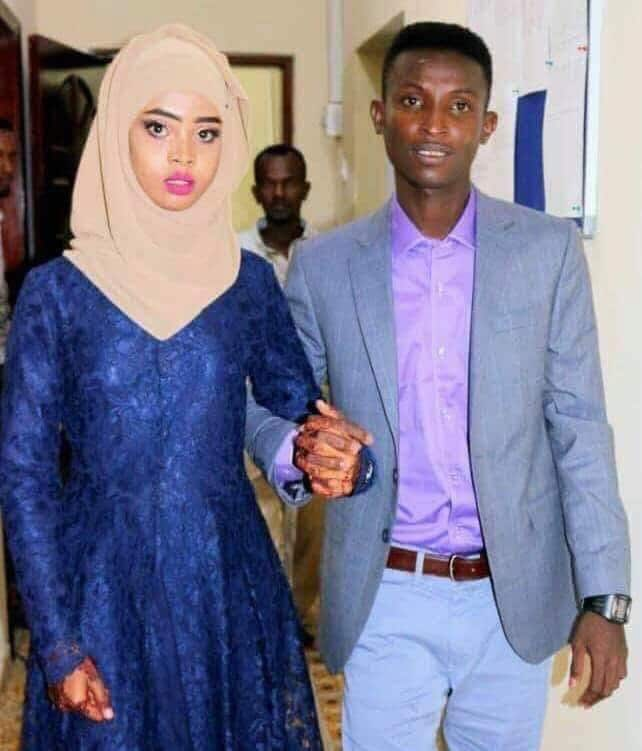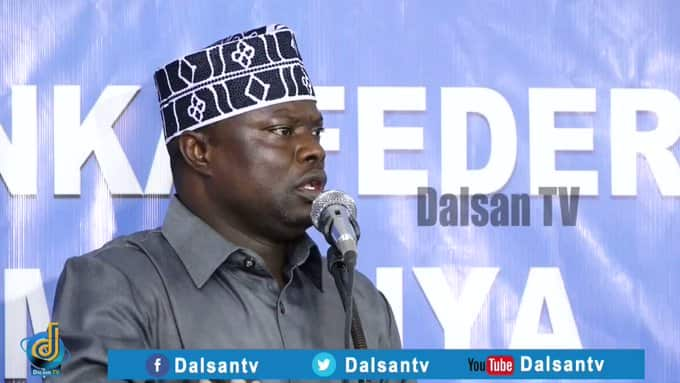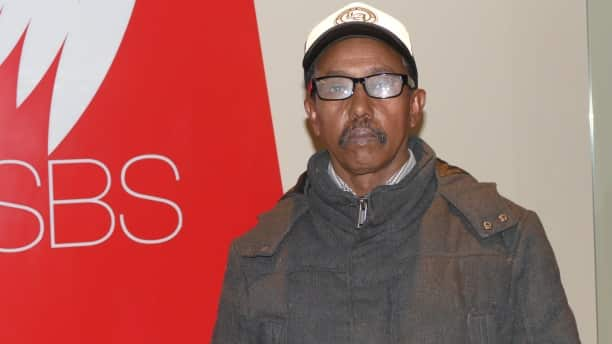Ahmed Dawlo was beaten, doused in petrol and set alight in his garage in the Mogadishu suburb of Yaqshid.
It is alleged that Dawlo was attacked by the family of his nephew’s bride, who disapproved of the inter-clan marriage and suspected that Dawlo had facilitated it and hidden the couple away. Local reports state that Dawlo was killed while the newlywed couple were on their honeymoon.
Clan divisions
The clan structure in Somalia remains socially and politically important and has been strengthened by 30 years of state collapse and the absence of strong state institutions. Dawlo’s nephew is from a Bantu clan also known as Jareerweyne while the woman he married is from another Somali clan.
Dawlo’s nephew is from a Bantu clan also known as Jareerweyne while the woman he married is from another Somali clan.

The young couple at center of the marriage dispute, Mohamed Abdirahman and Ruqiya Abdullahi (Source: Dalsan Tv) Source: Kalsan Tv
Bantus are of a different ethnicity to most other clans in Somalia, which contributes to greater discrimination and racial prejudice against Bantu people.
Inter-clan marriages between people from marginalised and major clans are traditionally prohibited, with more powerful clans refusing to allow marriages with Bantu people and members of other marginalised clans. Such married couples face hostility, frequently being cut off from family contact and even violence, as is alleged in the case of Dawlo’s death.
Inter-clan marriage is only prohibited by local custom in Somalia, not on any legal or religious grounds. Mr Dawlo’s killing was widely condemned by all sectors of society including politicians and religious leaders.
This incident has highlighted a wider issue of bigotry and discrimination against members of marginalised clans.
A symptom of a wider problem
Mohamed Nur is an MP in the Somali Federal Parliament, and hails from a Bantu clan. Speaking in the Federal Parliament of Somalia, Nur said that he faces frequent discrimination and racial profiling. “I arrived at Mogadishu airport and holding Somali diplomatic passport, the immigration officers without asking me assumed that I was foreign national who obtained Somali Passport,” Nur told the parliament. “They were speaking to me in English rather than Somali language and asking themselves in Somali, ‘How did this Ugandan obtain Somali diplomatic passport?’”
“I arrived at Mogadishu airport and holding Somali diplomatic passport, the immigration officers without asking me assumed that I was foreign national who obtained Somali Passport,” Nur told the parliament. “They were speaking to me in English rather than Somali language and asking themselves in Somali, ‘How did this Ugandan obtain Somali diplomatic passport?’”

Mohamed Nur, a member of Somalia's federal parliament, says he frequently faces discrimination for his clan and ethnicity (Source: Dalsan Tv) Source: Dalsan TV
“In another incident someone almost removed me from a mosque mistaking me for a non-Muslim foreigner,” Nur added.
Discrimination in the diaspora
The Somali diaspora often reflects the social and political attitudes held in the homeland, with clan-based discrimination also taking place outside Somalia. Ahmed Ayjeex is a leader of a coalition of marginalised clans in Australia.
Ahmed Ayjeex is a leader of a coalition of marginalised clans in Australia.

Ahmed Ayjeex says that discrimination against his clan has increased since the collapse of Somali government three decades ago" (Source: SBS Somali) Source: SBS Somali
He says discrimination between clans has increased since the collapse of Somalia’s government in 1991 as people came to rely more on clan powers than government institutions for justice.
“The discrimination was minimal but after the collapse of the government 28 years ago the impact has been more on our clans because every region is controlled and dominated by major clans,” Ayjeex tells SBS. “So our clans and other minorities don’t get justice in the cases of land disputes - as is always the case, we lose and there are no opportunities for us either in terms of employment.”
Asked if marriage discrimination also occurs within the Somali community in Australia, Ayjeex says he knows of a case in South Australia where a young Bantu man and a young woman from another clan were dating. The woman’s family found out and intimidated the young man and his family into ending the relationship.
Ayjeex notes that there are hundreds of thousands Somalis in diaspora across the world. More and more Somalis are marrying from different countries, ethnicities and religions, he says, yet many continue to deny their fellow Somalis the right to marry between clans.
Public condemnation
The reaction to Mr Dawlo’s death on social media appears to show a majority of Somalis are appalled by the killing and marriage discrimination still prevalent in Somalia.
Some pointed out that this incident has united people from across the society against bigotry and hate.
Many responses demanded justice for the victim and were appalled that such violent behavior could take place in 2018 calling it “barbaric and revolting”.
Some also said that while Mr Dawlo's killing was appalling, it was not fair to condemn the family for refusing the marriage because it is a widely accepted norm in the country. These commentators challenged the politicians and religious leaders who spoke against the attack to marry their children to marginalised clan members if they were serious about eliminating the practice.
In an effort to combat this issue the former president of the Somali Region of Ethiopia, Abdi Omar, organised a mass wedding in the region’s capital Jigjiga last year. Couples from majority and marginalised clans were married together, and Omar has given each couple a house.
While violence caused by marriage disputes is rare, Mr Dawlo’s slaying was not an isolated incident.
In 2017 there was a similar event in Hargeisa, the capital of the self-declared republic of Somaliland. When the family of a man from a marginalised clan followed custom to ask the potential bride’s family for their blessing, the man’s father was allegedly attacked while the bride-to-be was allegedly detained and tortured by her own family, hung upside down by her legs in their home. When the family of the man went to the police station, they were arrested and the couple reportedly fled the country.
Fundraising has been set up for the family of Mr Dawlo while the alleged perpetrators of his murder are awaiting trial.
Share
